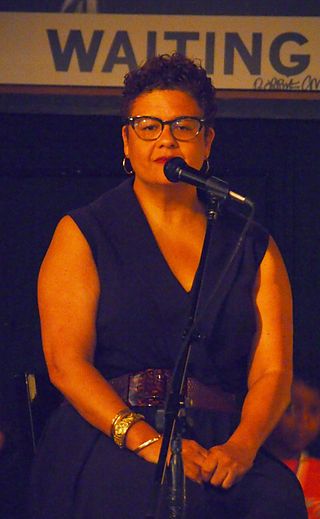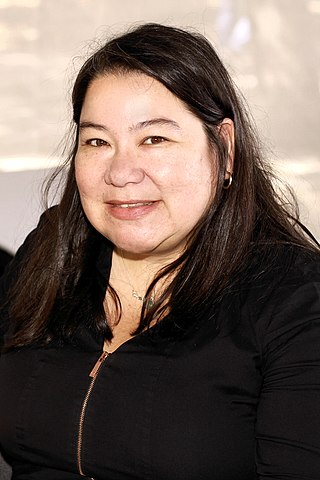
Rita Frances Dove is an American poet and essayist. From 1993 to 1995, she served as Poet Laureate Consultant in Poetry to the Library of Congress. She is the first African American to have been appointed since the position was created by an act of Congress in 1986 from the previous "consultant in poetry" position (1937–86). Dove also received an appointment as "special consultant in poetry" for the Library of Congress's bicentennial year from 1999 to 2000. Dove is the second African American to receive the Pulitzer Prize for Poetry, in 1987, and she served as the Poet Laureate of Virginia from 2004 to 2006. Since 1989, she has been teaching at the University of Virginia in Charlottesville, where she held the chair of Commonwealth Professor of English from 1993 to 2020; as of 2020 she holds the chair of Henry Hoyns Professor of Creative Writing.
David Lehman is an American poet, non-fiction writer, and literary critic, and the founder and series editor for The Best American Poetry. He was a writer and freelance journalist for fifteen years, writing for such publications as Newsweek, The Wall Street Journal, and The New York Times. In 2006, Lehman served as Editor for the new Oxford Book of American Poetry. He taught and was the Poetry Coordinator at The New School in New York City until May 2018.
The Best American Poetry 2005, a volume in The Best American Poetry series, was edited by David Lehman and by guest editor Paul Muldoon.
The Best American Poetry 2006, a volume in The Best American Poetry series, was edited by David Lehman, and poet Billy Collins, guest editor.
The Best American Poetry 2002, a volume in The Best American Poetry series, was edited by David Lehman, with poems chosen by guest editor Robert Creeley.
The Best American Poetry 2001, a volume in The Best American Poetry series, was edited by David Lehman and by guest editor Robert Hass.
The Best American Poetry series consists of annual poetry anthologies, each containing seventy-five poems.
The Best of the Best American Poetry 1988–1997, a volume in The Best American Poetry series, was edited by David Lehman and by guest editor Harold Bloom, who chose the poems.
The Best American Poetry 1995, a volume in The Best American Poetry series, was edited by David Lehman and by guest editor Richard Howard.

The Best American Poetry 1990, a volume in The Best American Poetry series, was edited by David Lehman and by guest editor Jorie Graham. The book contains seventy-five poems with a range of poet-authors from a college freshman to the 1990 United States Poet Laureate. David Lehman publicly commented that poetry in America retains its vitality for both the poet and reader, after the 1989 series book attained bestseller status.
Ōrongohau | Best New Zealand Poems is an annual online anthology of poems chosen by guest editors. The anthology began in 2001 and is published by the International Institute of Modern Letters at Victoria University of Wellington in New Zealand. It is supported by a grant from Creative New Zealand.
The Best American Poetry 2007, a volume in The Best American Poetry series, was edited by poet Heather McHugh, guest editor, who made the final selections, and David Lehman, the general editor for the series.

Elizabeth Alexander is an American poet, essayist, playwright, and the president of the Andrew W. Mellon Foundation since 2018. Previously she was a professor for 15 years at Yale University, where she taught poetry and chaired the African American studies department. In 2015, she was appointed director of creativity and free expression at the Ford Foundation. She then joined the faculty of Columbia University in 2016, as the Wun Tsun Tam Mellon Professor in the Humanities in the Department of English and Comparative Literature.

Brenda Shaughnessy is an award-winning Asian American poet most known for her poetry books Our Andromeda and So Much Synth. Her book, Our Andromeda, was named a Library Journal "Book of the Year," one of The New York Times's "100 Best Books of 2013." Additionally, The New York Times and Publishers Weekly named So Much Synth as one of the best poetry collections of 2016. Shaughnessy works as an Associate Professor of English in the MFA Creative Writing program at Rutgers-Newark.
Erin Belieu is an American poet.
Lynne McMahon is an American poet.
Diann Blakely was an American poet, essayist, editor, and critic. She taught at Belmont University, Harvard University, Vanderbilt University, led workshops at two Vermont College residencies, and served as senior instructor and the first poet-in-residence at the Harpeth Hall School in Nashville, Tennessee. A "Robert Frost Fellow" at Bread Loaf, she was a Dakin Williams Fellow at the Sewanee Writers' Conference at which she had worked earlier as founding coordinator.
Rebecca Hazelton Stafford is an American poet, editor and critic.

Sonata Mulattica : A Life in Five Movements and a Short Play is a collection of poems by U.S. poet laureate Rita Dove, published in 2009, about the life of George Bridgetower. Bridgetower was a biracial musician who was friends with Beethoven. Beethoven's Kreutzer Sonata was originally dedicated to Bridgetower, and was originally entitled "Sonata mulattica composta per il mulatto Brischdauer [Bridgetower], gran pazzo e compositore mulattico"